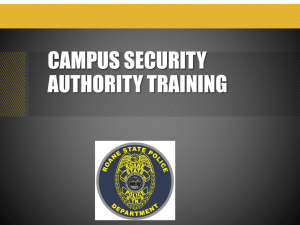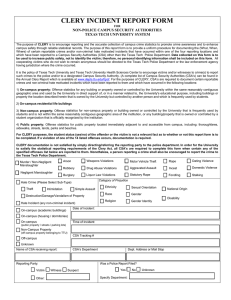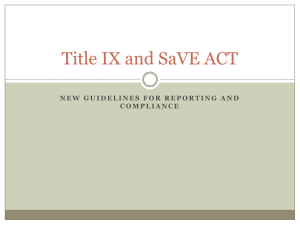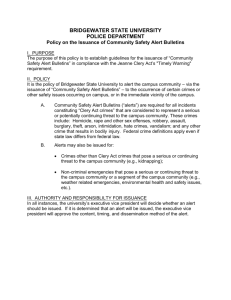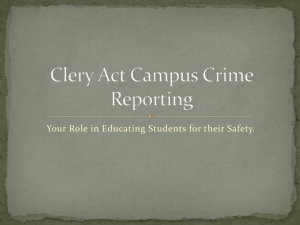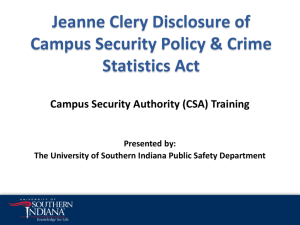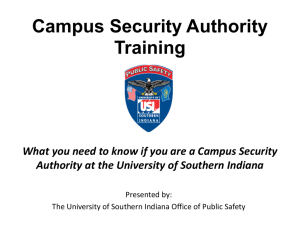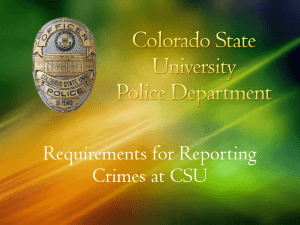Campus security authority (CSA) training
advertisement
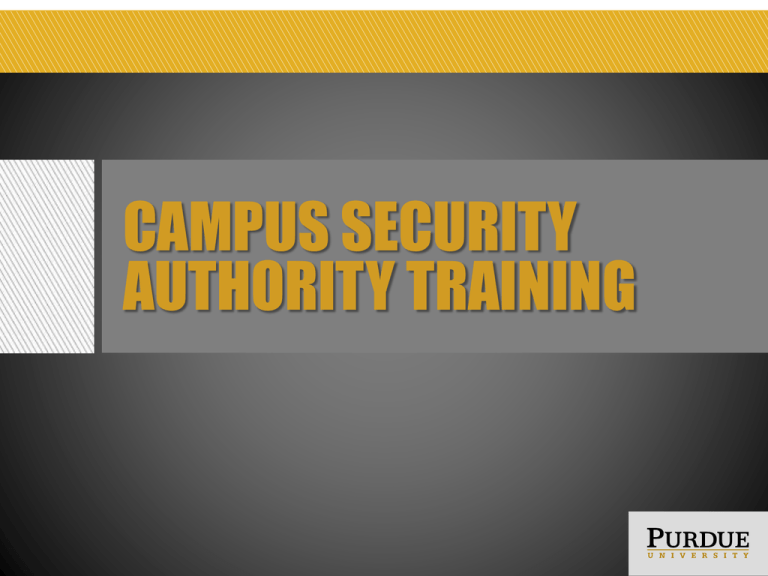
CAMPUS SECURITY AUTHORITY TRAINING GOAL AND OBJECTIVE •Goal • Increase your understanding of the Clery Act and your roles and responsibilities as a Campus Security Authority (CSA) in reporting Clery Act crimes. •Objective • You will be able to carry out your responsibilities as a CSA to report, in good faith, allegations of Clery Act crimes to campus police or security. OVERVIEW What is the Clery Act? Who is a Campus Security Authority (CSA)? What are your responsibilities as a CSA? Which crimes should you report? How do you report Clery Act crimes? WHAT IS THE CLERY ACT? • Federal law that requires colleges and universities to disclose information about crime on and around their campuses reported to: • Local police agencies • Campus Security Authorities RESPONSIBILITIES FOR PURDUE • The University is required to: • Disclose campus crime statistics annually • Maintain a daily crime log • Issue timely safety warnings and emergency notifications • Make campus security policies available • Report Clery reportable crimes to the Department of Education WHO IS A CSA? 1. Campus police or security Exclusions: 2. Non-police security staff responsible for monitoring • Pastoral counselor • Professional counselor University property 3. Any individual or organization designated to receive reports of criminal offenses from students and employees 4. An official who has significant responsibility for student and campus activities WHAT ARE YOUR RESPONSIBILITIES? 1. • Dial 911 in an emergency or if anyone is in imminent danger 2. • Provide resources to the individual for help and support 3. • Inform the individual you must report the incident as a confidential statistic 4. • Report allegations, made in “good faith,” of Clery Act crimes to the police as soon as possible WHAT AREN’T YOUR RESPONSIBILITIES? DO NOT: • Apprehend the alleged perpetrator of the crime • Insist the victim contact law enforcement if the victim chooses not to do so • Try to make an authoritative determination as to whether or not a crime took place WHICH CRIMES SHOULD YOU REPORT? Criminal Offense • Criminal Homicide • Murder/Non-negligent manslaughter • Negligent manslaughter • Sexual Assault • Forcible • Non-forcible • Robbery • Aggravated Assault • Burglary • Motor Vehicle Theft • Arson CRIMES YOU SHOULD REPORT (CONTINUED) Motivated by negative opinion or attitude based on: Hate Crimes • • • • Larceny-Theft Simple Assault Intimidation Destruction/Damages/ Vandalism • Criminal Offenses (as described) • • • • • • • • Race Gender Religion National Origin Sexual Orientation Gender Identity Ethnicity Disability CRIMES YOU SHOULD REPORT (CONTINUED) Violations • Liquor Law • Drug Law • Weapon Law Other Crimes • Domestic Violence • Dating Violence • Stalking Incidents *Count a crime regardless of whether it is attempted or completed REPORTABLE CRIME LOCATIONS • On campus • e.g. – residence halls or administrative buildings • Public Property • e.g. – sidewalks or parking near campus • Non-campus property • e.g. – fraternity or sorority house HOW DO I REPORT A CRIME? Report the following to campus police or security: What type of crime? Where did it occur? When did it occur? When was it reported to you? Who was the victim? * Were there any witnesses? * Are there any suspects? * *Indicates information which the individual may elect NOT to report SUMMARY • You play a critical role in maintaining a safe campus • Report Clery crimes to the police as soon as possible • When in doubt, report the crime • Provide the facts and details • Provide resources to the individual ADDITIONAL RESOURCES & CERTIFICATION QUIZ University Clery Act Website www.purdue.edu/cleryact Required Certification Quiz www.purdue.edu/webcert
